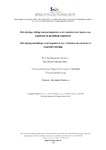Role-playing y diálogo como protagonistas en la evaluación entre iguales: una experiencia de aprendizaje cooperativo

Use this link to cite
http://hdl.handle.net/2183/25525
Except where otherwise noted, this item's license is described as Atribución-NoComercial-SinDerivadas 4.0 España
Collections
Metadata
Show full item recordTitle
Role-playing y diálogo como protagonistas en la evaluación entre iguales: una experiencia de aprendizaje cooperativoAlternative Title(s)
Role-playing and dialogue as protagonists in peer evaluation: an experience of cooperative learningDate
2020Citation
Hernández Gándara, A., & Cañabate Ortiz, D. (2020). Role-playing y diálogo como protagonistas en la evaluación entre iguales: una experiencia de aprendizaje cooperativo. Sportis. Scientific Journal of School Sport, Physical Education and Psychomotricity, 6(2), 182-203. https://doi.org/10.17979/sportis.2020.6.2.6041
Abstract
[Resumen] El trabajo en grupos interdisciplinares, la toma de decisiones, la resolución de problemas, las
habilidades interpersonales, la capacidad crítica y autocrítica, el liderazgo, etc., son
competencias que exigen a docentes de escuela y universidad la redefinición continua de
nuevos métodos de evaluación, que permitan valorar la adquisición de habilidades,
capacidades y conocimientos por parte del alumnado. El objetivo de esta intervención se
centra en la implementación y valoración de una metodología cooperativa y evaluación
dialogada basada en dinámicas de role-playing. Se contextualiza en la asignatura de Juegos y
habilidades motrices básicas del segundo curso del Grado en Ciencias de la Actividad Física
y del Deporte de la Universidad Europea Miguel de Cervantes durante el curso 2019. En esta
investigación descriptiva han participado 44 estudiantes, que debían de diseñar, organizar e
impartir una práctica cooperativa (3-4 estudiantes por grupo) al resto de compañeros. Al final
de semestre, se llevó a cabo una encuesta de valoración del proceso mediante un cuestionario
perteneciente al Proyecto de Innovación Educativa “Alumnos que enseñan a alumnos” de la
misma universidad. Los resultados reflejan una alta satisfacción del estudiantado respecto a la
enseñanza y evaluación entre iguales, reconociendo una mayor implicación personal en su
propio aprendizaje y en el de los demás. [Abstract] Working in interdisciplinary groups, decision making, problem solving, interpersonal
skills, critical and self-critical ability, leadership, etc., are competencies that require school
and university teachers to continually redefine new evaluation methods, which allow to assess
the acquisition of skills, abilities and knowledge by students. The objective of this
intervention is focused on the implementation and evaluation of a cooperative methodology
and dialogue evaluation based on role-playing dynamics. It is contextualized in the subject of
Basic games and motor skills of the second year of the Degree in Physical Activity and Sports
Sciences of the European University Miguel de Cervantes during 2019. In this descriptive
investigation 44 students participated, who had to design, organize and impart a cooperative
practice (3-4 students per group) to the rest of their classmates. At the end of the semester, a
process assessment survey was carried out by means of a questionnaire belonging to the
Educational Innovation Project “Students who teach students” of the same university. The
results reflect high student satisfaction with peer teaching and evaluation, recognizing greater
personal involvement in their own learning and that of others.
Keywords
Juego de roles
Evaluación dialogada
Enseñanza entre iguales
Aprendizaje cooperativo
Feedback role-playing
Dialogue evaluation
Peer learning
Cooperative learning
Feedback
Evaluación dialogada
Enseñanza entre iguales
Aprendizaje cooperativo
Feedback role-playing
Dialogue evaluation
Peer learning
Cooperative learning
Feedback
Editor version
Rights
Atribución-NoComercial-SinDerivadas 4.0 España
ISSN
2386-8333






